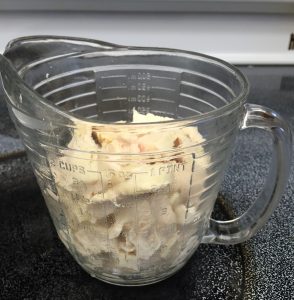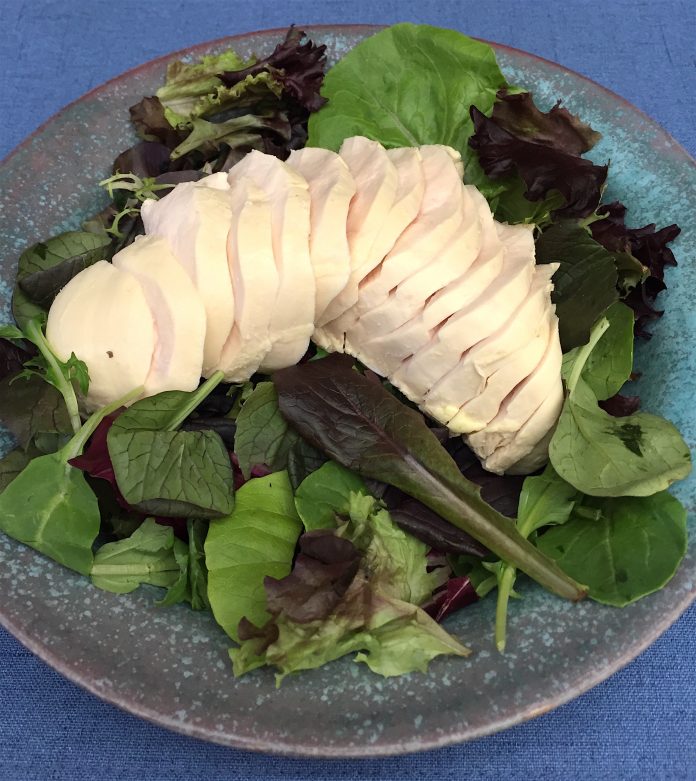By Chris Watson
For many of us, the minute we see the words “2 cups cooked chicken” we sigh in frustration. We know that we only have a few options: canned, frozen, deli, or leftover. And we know none of those options are very good. Canned has a mushy, pet food consistency, frozen is almost always bad, and pre cooked chicken either off of a rotisserie chicken from the deli or one that we baked ourselves the previous day comes out dry, bordering on jerky. There is one other word we associate with “cooked chicken”: expensive.
However, with a simple technique it is easy to poach chicken. It doesn’t take very long, isn’t messy, and will result in moist, flavorful chicken plus yield a broth that can be frozen and used in further recipes.[cycloneslider id=”poaching-chicken”]
Price Per Ounce
Canned or “pouch” chicken is overpriced…and that is being charitable. So is shredded chicken you buy frozen, bagged, or even “shredded” in a deli container. Part of that overpricing is that we WANT it…buffalo chicken dip, artichoke chicken dip, florentine chicken dip, not to mention the casseroles, salads, and spreads that call for chunked or shredded chicken. Plus, having some flavorful, cooked chicken around is a good way to supplement a salad, add to nachos, or season up and make chicken tacos. Cooked chicken is culinary gold.

Back to expensive. A can or pouch defines a serving size as about ¼ cup (about 2 oz) and lists at 3.5 servings…or not quite a cup. Average cost? If you are lucky you can get it for $3. Frozen and pre-cut or shredded is about the same coming in at a minimum of $6 per pound and a cup is half that or $3.
The problem is that most recipies call for at least a cup, many for 2 cups. Plus, half a cup of chicken just isn’t very much. If you have any kind of appetite at all you will quickly tire of eating 2 oz (a supposed serving) of chicken.
Now the cost. A 12 oz boneless skinless chicken breast is, at most, $1.5 (Assuming $2/lb for the chicken). Poached it will yeild about 1.5 cups, or 6 quarter cup servings. Add a dollar or so
for the ingredients for the broth and to get to the usual 2 cups required for a recipie and you are at $4, or ⅔ the cost of canned or pouched. Plus you are left with at least a “box” or even two of chicken stock, where each box runs about $3 at the store. Obviously, poaching chicken is the answer.
Poaching Chicken (not deer)
Poaching has gotten a bad cooking rap. For some reason it has come to represent “boiled” and dry and chewy. The reason is that we really don’t know how to poach. Poaching is either taking an animal, such as a deer, illegally, or cooking meat, vegetables, or eggs in ALMOST boiling water.
We will assume you acquired you chicken legally. That means that you want to cook your chicken gently in ALMOST boiling water. Actually, we should say cooking in ALMOST boiling liquid. Poaching liquid can be simply water or it can be a wonderfully complex broth that add to the flavor (and can be reserved for other uses like soups). Regardless of how sophisticate the liquid is, the key word is

ALMOST. Poaching is a gentle process where, once the meat is added the heat is turned down to a very low simmer or, preferable, just below a simmer.
This is why people avoid poaching. It take a bit of practice. However, it isn’t as hard as we think if we use a method many of us are already use to for cooking hard boiled eggs: lid and sit.
Lid and Sit
The easiest way to hard boil an egg is this: place a single layer of eggs in a large, heavy pan and fill with cold water. Bring the eggs and water to a boil then turn off the heat. Place a lid on the pan and let them sit for 17 minutes. Remove from the water and run under cold water then refrigerate.
This will work with chicken as well. The key is boneless skinless chicken breast that has been completely thawed. It doesn’t matter how big the chicken breasts are or how many you have. All you adjust is the amount of liquid and the size of the pan to accommodate your additional chicken.
Here is the basics, with the full recipe below. In a large, heavy pan bring your poaching liquid to a full boil. Gently slide the fully thawed boneless skinless chicken breasts into the liquid. If they are not fully covered after you have place them in the pan add enough liquid to completely cover. Return the liquid to a boil (if necessary. If you go slow you won’t need to) and once boiling turn off the head, place a lid on the pan, and let sit for 30 minutes.
A note on poaching liquid. The variations are endless. What we have listed in the recipe is a basic. You can, for instance, substitute wine for the lemon (and adjust the liquid accordingly), use about any herb you like, skip the chicken base and go to a vegetable base (and reduce the aromatics), or really just poach in some salted water.
Remove the chicken and do with it what you will. Strain the broth and use it is a soup or stew.
That is it. You now have sliceable, shreddable, cube ready, chicken breast. Plus bonus broth! It will last in the fridge for a couple of days. You can also place a little of your liquid in a vacuum seal bag and freeze the whole breasts for later use (or cube them and freeze). This is basically like having a couple cans of chicken in your pantry. For baked recipes this is fine. However, to place on top of a salad we recommend using the chicken without freezing. The texture is better.
- 3 (up to 6) boneless skinless chicken breast, completely thawed
- 6-8 cups water (enough to entirely cover chicken breasts
- 2 carrots, washed and ends cut off (no need to peel)
- 3 ribs of celery with leaves
- 1 small onion (or ½ medium onion)
- 2 cloves of garlic
- ½ fresh lemon (optional)
- 1½ tsp thyme (or herb blend to taste)
- 1 tbs peppercorns
- 1 tbs chicken or vegetable base (boullion)
- Rough chop all the vegetables. There is no need to peel the carrots but wash completely. You may substitute some wine (up to 2 cups) but omit lemon if you use wine.
- Place all ingredients except chicken in a heavy pan and cover with water.
- Bring all to a boil and boil for 5-10 minutes.
- Carefully place chicken breasts into the liquid and, if necessary add more water to ensure chicken is entirely covered. Then return to a boil if necessary.
- Once boiling remove from heat, place a tight lid on the pot and let sit for 30 minutes. Do not remove lid durning the 30 minutes
- Remove chicken and slice, shred, or chunk as desired.
- Strain poaching liquid and freeze for use in other recipes.
[cycloneslider id=”poaching-chicken-recipe”]
Buffalo Chicken Dip
Here is a smaller size version of a hot dip favorite, Buffalo Chicken Dip using our poached chicken. This one uses blue cheese but a cheddar will substitute nicely.
- 1.5-2 cups (one large pouch or can or 1 poached chicken breast) cooked chicken
- 1 8 oz packaged cream cheese (neufchâtel is fine)
- ¼ (up to ½) cup hot sauce (Texas Pete etc)
- ½ cup ranch dressing
- ½ cup blue cheese crumbles (or 1 cup cheddar)
- Over low heat blend the cream cheese, hot sauce and ranch dressing together
- Fold in the chicken and blue (cheddar) cheese
- Place in a shallow baking dish and bake at 350 for 20-30 minutes
- This can be done in the microwave or a crock pot but the consistency of the dip is much better by baking a few minutes
- Serve with crackers, chips, and cut up vegetables








awesome info!